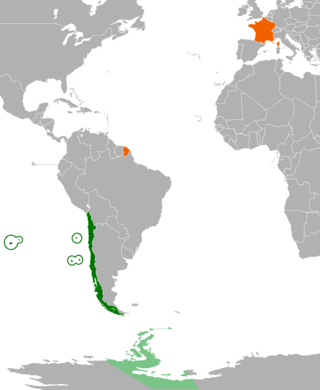
Salvador Guillermo Allende Gossens was a Chilean socialist politician who served as the 28th president of Chile from 1970 until his death in 1973. As a socialist committed to democracy, he has been described as the first Marxist to be elected president in a liberal democracy in Latin America.
Nueva canción is a left-wing social movement and musical genre in Latin America and the Iberian Peninsula, characterized by folk-inspired styles and socially committed lyrics. Nueva canción is widely recognized to have played a profound role in the pro-democracy social upheavals in Portugal, Spain and Latin America during the 1970s and 1980s, and was popular amongst socialist organizations in the region.

Víctor Lidio Jara Martínez was a Chilean teacher, theater director, poet, singer-songwriter and Communist political activist. He developed Chilean theater by directing a broad array of works, ranging from locally produced plays to world classics, as well as the experimental work of playwrights such as Ann Jellicoe. He also played a pivotal role among neo-folkloric musicians who established the Nueva canción chilena movement. This led to an uprising of new sounds in popular music during the administration of President Salvador Allende.

Isabel Angelica Allende Llona is a Chilean-American writer. Allende, whose works sometimes contain aspects of the magical realism genre, is known for novels such as The House of the Spirits and City of the Beasts, which have been commercially successful. Allende has been called "the world's most widely read Spanish-language author." In 2004, Allende was inducted into the American Academy of Arts and Letters, and in 2010, she received Chile's National Literature Prize. President Barack Obama awarded her the 2014 Presidential Medal of Freedom.

The Socialist Party of Chile is a centre-left political party founded in 1933. Its historic leader was President of Chile Salvador Allende, who was deposed in a coup d'état by General Augusto Pinochet in 1973. The military junta immediately banned socialist, Marxist and other leftist political parties. Members of the Socialist party and other leftists were subject to violent suppression, including torture and murder, under the Pinochet dictatorship, and many went into exile. Twenty-seven years after the 1973 coup, Ricardo Lagos Escobar won the Presidency as the Socialist Party candidate in the 1999–2000 Chilean presidential election. Socialist Michelle Bachelet won the 2005–06 Chilean presidential election. She was the first female president of Chile and was succeeded by Sebastián Piñera in 2010. In the 2013 Chilean general election, she was again elected president, leaving office in 2018.

María Isabel Allende Bussi is a Chilean politician and the youngest daughter of former Chilean president Salvador Allende Gossens.

Latin American literature consists of the oral and written literature of Latin America in several languages, particularly in Spanish, Portuguese, and the indigenous languages of Latin America. This article is only about Latin American literature from countries where Spanish is the native/official language. Even though these 18 countries share a language, each one has its unique literary traditions although they often overlap with those of other countries. Here only the most general literary trends are discussed. Latin American literature rose to particular prominence globally during the second half of the 20th century, largely due to the international success of the style known as magical realism. As such, the region's literature is often associated solely with this style, with the 20th century literary movement known as Latin American Boom, and with its most famous exponent, Gabriel García Márquez. Latin American literature has a rich and complex tradition of literary production that dates back many centuries.

Pablo Neruda was a Chilean poet-diplomat and politician who won the 1971 Nobel Prize in Literature. Neruda became known as a poet when he was 13 years old and wrote in a variety of styles, including surrealist poems, historical epics, political manifestos, a prose autobiography, and passionate love poems such as the ones in his collection Twenty Love Poems and a Song of Despair (1924).

SS Winnipeg was a French steamer notable for arriving at Valparaíso, Chile, on 3 September 1939, with 2,200 Spanish immigrants aboard. The refugees were fleeing Spain after Franco's victory in the Spanish Civil War (1936–1939). The Chilean President Pedro Aguirre Cerda had named the poet Pablo Neruda Special Consul in Paris for Immigration, and he was charged with what he called "the noblest mission I have ever undertaken": shipping the Spanish refugees, who had been housed by the French government in internment camps, to Chile.
In Chile, the National Prize for Literature(Premio Nacional de Literatura) was created by Law No. 7,368 during the presidency of Juan Antonio Ríos on 8 November 1942. It consists of a lump-sum monetary prize and a lifetime monthly stipend. It was originally awarded every year until the amendments introduced by Law No. 17,595 of 1972, when it became biennial. It's regarded as one of the National Prizes in their homeland.

Chile–Russia relations are the bilateral foreign relations between Chile and Russia. The establishment of diplomatic relations between Chile and the USSR countries happened on December 11, 1944.
Many Basques arrived in Chile in the 16th, 17th, 18th, 19th and early 20th century from their homeland in northern Spain and parts of southwestern France, as conquistadors, soldiers, sailors, merchants, priests and labourers. Due to their traditional hard work and entrepreneurship, many of them rose to the top of the social scale and intermarried into the Chilean elites of Castilian descent, giving birth to the new Basque-Chilean aristocracy in Chile. This union is the basis of the Chilean elite of today. But also, they immensely contributed to the ethnic make up of the bulk of the Chilean population. The Basque settlers also intermarried into the Mestizo and Castizo population of central Chile in the middle of the colonial period to form the large Criollo population that exists in Chile today; Castizos create modern middle and lower classes. Many years after the first waves of settlers, thousands of Basque refugees fleeing Spanish Civil War in 1939 also settled and have many descendants in the country and have even intermarried with Spanish ethnic groups other than Castilians, and other European ethnic groups. An estimated 1.6 million (10%) to 5 million (30%) Chileans have a surname of Basque origin. This figure is to the least as the number of Basque descendence is great and plentiful. Due to Basque migration, Chile has a higher number of people of Basque descent than the Basque Country itself.

Chilean literature refers to all written or literary work produced in Chile or by Chilean writers. The literature of Chile is usually written in Spanish. Chile has a rich literary tradition and has been home to two Nobel prize winners, the poets Gabriela Mistral and Pablo Neruda. It has also seen three winners of the Miguel de Cervantes Prize, considered one of the most important Spanish language literature prizes: the novelist, journalist and diplomat Jorge Edwards (1998), and the poets Gonzalo Rojas (2003) and Nicanor Parra (2011).
Nick Caistor is a British translator and journalist, best known for his translations of Spanish, French, and Portuguese literature. He is a past winner of the Valle-Inclán Prize for translation. He is a regular contributor to BBC Radio 4, the BBC World Service, The Times Literary Supplement, and The Guardian. He lives in Norwich, and is married to fellow translator Amanda Hopkinson, with whom he frequently collaborates in his translation work.
The Premio Valle-Inclán is a literary translation prize. It is awarded by the Society of Authors for the best English translation of a work of Spanish literature. It is named after Ramón del Valle-Inclán. The prize money is GBP £3,000 and a runner-up is awarded £1,000.

Inés of My Soul is a historical novel by the Chilean author, Isabel Allende. The novel consists of an elderly Inés Suárez writing a memoir of her own life. She narrates about her relationship with Pedro de Valdivia and the obstacles they had to overcome to conquer Chile and found the City of Santiago.
Margarita Aguirre was a Chilean writer and critic. She was the friend and first biographer of Nobel-winning poet Pablo Neruda.

The Pablo Neruda Order of Artistic and Cultural Merit was created in 2004 by the National Council of Culture and the Arts of the government of Chile, as part of the commemoration of the 100th anniversary of the birth of Chilean poet Pablo Neruda.

Chile–France relations are the diplomatic relations between Chile and France. Both nations are members of the Organisation for Economic Co-operation and Development, United Nations and the World Trade Organization.

Violeta is a 2022 novel by Chilean-American author Isabel Allende. It is a fictional autobiographical account of the life of Violeta Del Valle and how she witnessed the various upheavals of the 20th century. Violeta in the book recalls all she has seen and experienced in an unnamed South American country spanning 100 years.














